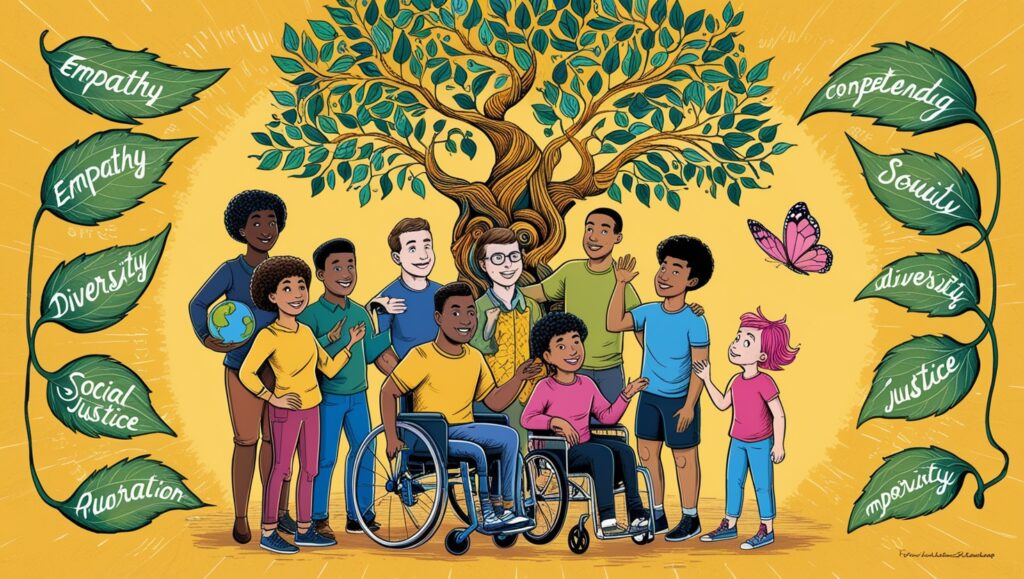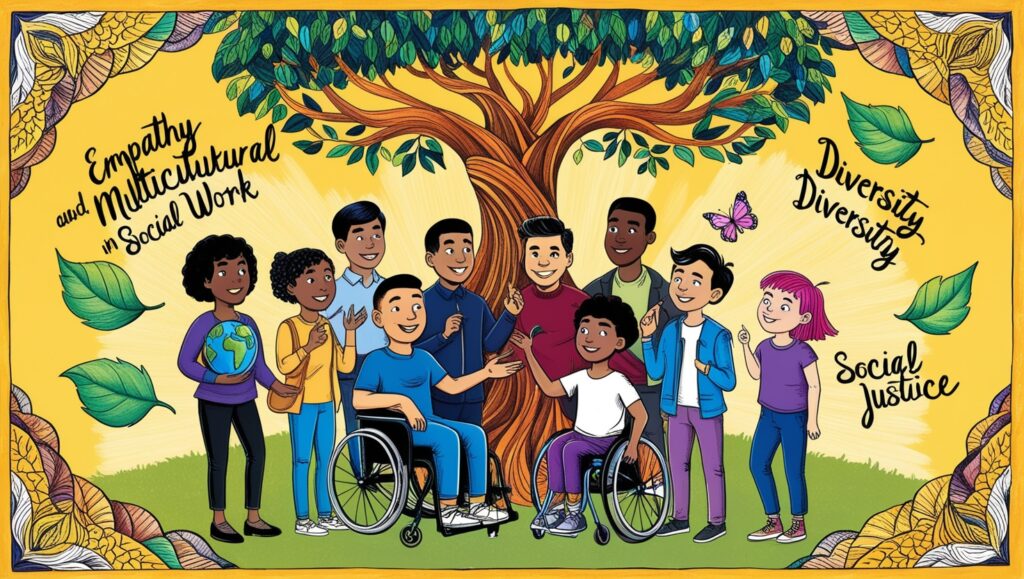Multicultural Competence
Values and multicultural competence in social work play a crucial role in guiding professionals as they strive to serve diverse communities effectively and ethically. Multicultural competence involves engaging meaningfully with individuals from various cultural backgrounds. Acknowledging and honoring cultural differences while understanding how these cultural contexts shape an individual’s experiences and needs is essential.
By practicing cultural competence, professionals can:
- Offer more effective and culturally aware assistance to varied communities
- Cultivate significant relationships and encourage beneficial results for individuals
- Address systemic barriers and promote equity and inclusivity
Social Work with Broader Society
Ethical responsibilities to the broader society include four areas that reflect the core of social work: advocating and working for people’s general welfare. Social workers should promote people’s general welfare on all levels, from the local to the global. They should become actively involved in the formulation of public policy and flock to provide help during emergencies (e.g., floods, tornadoes, or earthquakes).
As part of their professional responsibilities, social workers should;
- Pursue social and political action to ensure fair and equal access to resources and opportunities.
- It is essential to actively advocate for policies that enhance the well-being of individuals and foster social equity.
- There should be a focused effort to create and expand opportunities for those who are vulnerable, disadvantaged, oppressed, and exploited.
- Supporting conditions and policies that honor and respect cultural diversity is crucial.
- There should be efforts to address and remove conditions and policies that discriminate against or exploit individuals, particularly those who are most vulnerable.

Multicultural Competence in Social Work
Self-Awareness
Social workers must recognize their cultural backgrounds, biases, and assumptions. Individuals need to acknowledge their privilege and power and how these factors influence their interactions with clients.
Cultural Knowledge
Understanding cultural contexts is essential for professionals in this field. They should be well-informed about the histories, traditions, values, and experiences of various cultural groups, encompassing race, religion, ethnicity, gender identity, social class, sexual orientation, and ability. Additionally, it is essential to acknowledge and value the variety of cultures and beliefs present in our communities.
Cultural Skills
It is essential for social workers to choose interventions that are aligned with the cultural backgrounds and unique needs of the individuals they support. It is essential for social workers to build meaningful connections with clients from various cultural backgrounds, conduct assessments that reflect cultural awareness, and provide interventions that are sensitive to those unique cultural contexts.
Cultural Humility
Cultural humility is about dedicating oneself to the ongoing journey of learning about and appreciating diverse cultures, all while acknowledging personal limitations in understanding. Social workers must engage with humility, acknowledging that individuals possess a deep understanding of their cultural backgrounds. It is important for individuals to remain receptive to insights from clients and to engage in ongoing self-reflection regarding their own cultural biases.
Applying Cultural Competence in Practice
Social workers can show their understanding of diverse cultures through several actions, including:
- Promoting policies and services that are responsive to different cultural needs.
- Utilizing language and communication approaches that foster inclusivity and empowerment.
- Working with individuals to ensure decisions are made with cultural awareness and sensitivity.
- Actively pursuing opportunities for continuous education and growth in my professional journey.
Incorporating Values and Multicultural Competence
The ethical framework of social work highlights the significance of providing inclusive and equitable services that honor the cultural contexts of clients. This integration occurs through:
Client-Centered Practice
Social Workers consider each individual’s unique cultural background, beliefs, and values when developing support strategies.
Advocacy
Supporting social justice by promoting policies that tackle cultural inequities and systemic oppression. Advocating for policies and practices that foster equality and equity for everyone is essential.
Ethical Decision-Making
Understanding diverse cultural perspectives is essential for professionals as they address ethical challenges, particularly when cultural values may clash with prevailing societal standards.
Education and Training
Professionals in this field consistently enhance their understanding of diverse cultures through ongoing training, supervision, and reflective practice.

Challenges and Barriers
There are some challenges and barriers that social worker has to face such as;
Cultural Misunderstandings
Miscommunication or assumptions regarding cultural practices can result in challenges in providing effective services.
Systemic Oppression
Social Workers may encounter structural barriers when advocating for minority groups, particularly in settings where discrimination or racism remains prevalent.
Indirect Bias
It is essential for Social Workers to actively address and reduce their unconscious biases to prevent the reinforcement of stereotypes.
Conclusion
Understanding and respecting cultural differences is essential for professionals in today’s diverse community. It requires a deep comprehension, appreciation, and active involvement with individuals, families, and communities from diverse cultural backgrounds. By embracing cultural understanding and openness, professionals can offer more fair, inclusive, and impactful services to varied communities, ultimately fostering social equity and meaningful progress. Recognizing that multicultural competence is crucial in ensuring effective practice in this field is important. Grounded in fundamental principles, it directs professionals in providing culturally aware and responsive services, contributing to developing a more inclusive and fair society. In summary, the relationship between values and multicultural competence is essential, enabling professionals to deliver ethical, culturally aware, and effective support to various communities.






